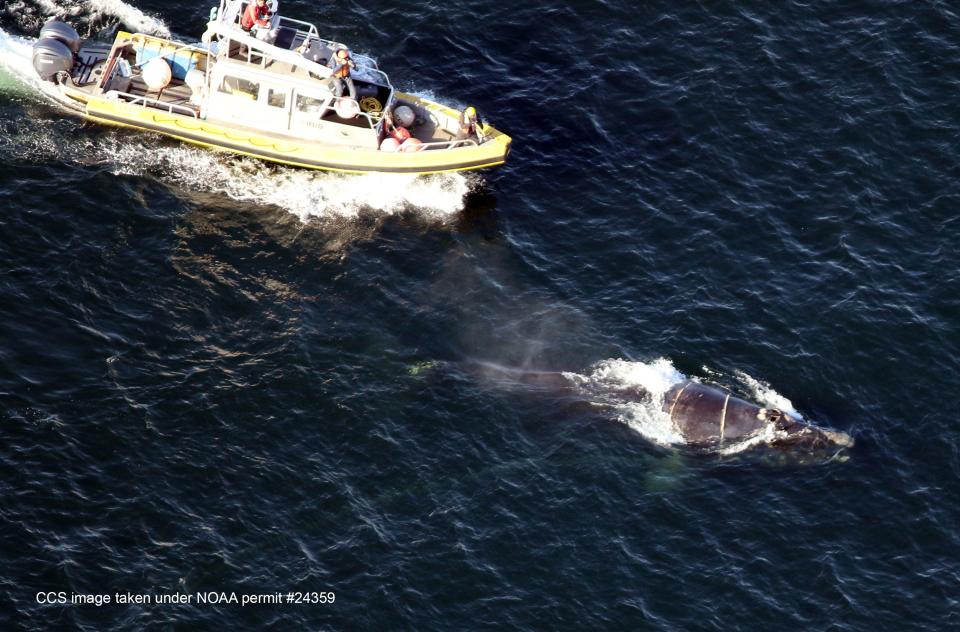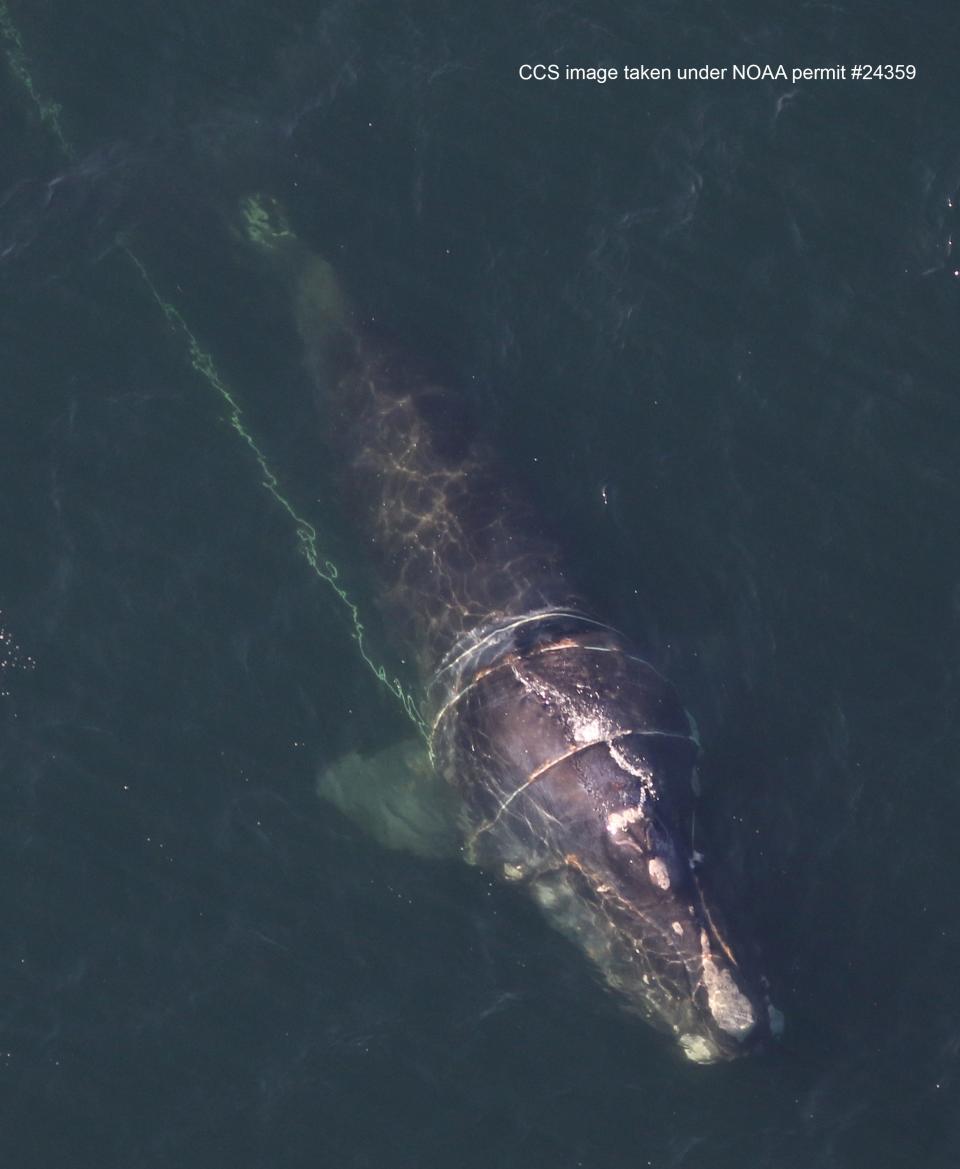'We will do the best we can.' Cape Cod rescuers hope to help severely entangled right whale in the bay
Hoping for the best, but preparing for the worst, the Center for Coastal Studies' Marine Animal Entanglement Response team was on Friday in the midst of trying to help a severely entangled North Atlantic right whale who had come into Cape Cod Bay — an effort hindered by rough seasonal seas and the complexity of the cetacean's rope-bound plight.
On Wednesday, the Provincetown-based team was able to remove 200 feet of rope from the animal, but was forced to pause the effort when they lost daylight. More work remained to be done to help the whale, known only as #4545 in the North Atlantic Right Whale Consortium's right whale catalog, maintained by the New England Aquarium.

Team director Scott Landry said her entanglement is "serious" — so much so that "without help the entanglement will kill her. And it won't be a quick death."
He noted that he and his team "worked very hard for this whale on Wednesday," even though "she did all she could to avoid us."
Here there be whales Right whales come up for air in Provincetown. Here's how to get a look from dry land.
A team is tracking the right whale in Cape Cod Bay, in hopes a rescue can continue.
As part of its response, the team attached a telemetry tracking buoy to the rope that remained wrapped around the whale with the hope of resuming their efforts later, when conditions on the water were safer and they have plenty of daylight.
"With the telemetry buoy in place on her entanglement all of our attention will be focused on trying again," Landry said.
Researchers came across #4545 earlier in the day on March 29 "smack dab in the middle of the bay" with a large group of feeding right whales, he said. At this time of year, much of the right whale population spends time in Cape Cod Bay before heading farther north for the summer. The species is critically endangered, with only about 340 individuals — plus or minus seven — remaining, according to a report released in the fall by the North Atlantic Right Whale Consortium.
In February, the 8-year-old female was spotted by an aerial team with the Northeast Fisheries Science Center just south of Nantucket. She was entangled at that time, but the Center for Coastal Studies reported all that could be discerned about her situation was that she had a long length of heavy rope caught through her mouth. The trained rescuers were unable to respond at the time because of distance and the lack of daylight.
The North Atlantic right whale has a 'highly complex' entanglement in rope, a Center for Coastal Studies expert said.
Since that last sighting, Landry said, #4545's situation worsened into what the scientists are describing as "a highly complex" entanglement, with multiple wraps around her body. It's likely her flippers may be affected as well.
"The fishing gear consists of an extremely long buoy line, hundreds of feet long," Landry said.

The whale has bitten down on the thick rope and "now she has used her body as a spool, in her panic" becoming wrapped in the rope. With weighted gear on both ends of the rope, and the constriction caused by her rolling, it is exerting a devastating amount of pressure on the whale, cutting into her skin.
"There are parts where the rope is not even visible. It's inside her," Landry said.
When she was found in the bay, he noted, "all of the whales around her were feeding, except her." While it could just be that she'd already had her fill, the scientists worry the entanglement may be hindering her ability to feed or causing an infection that's affected her appetite. He said the food resource the whales were feasting on "was so incredibly rich" it's difficult to imagine an able whale not partaking.
The disentanglement team from the Center for Coastal Studies intends to make another attempt to cut rope from the right whale.
Landry and his team intended on Friday to watch the forecast for very good weather conditions so they can make another attempt at saving #4545.
"There's definitely hope," he said.
But the team will need a combination of factors to come into play: calm enough sea conditions occurring at the right time of day to give them plenty of light for working, and #4545 remaining geographically close so she is accessible from their small boat. Considering normal conditions on New England's waters this time of year, that could be a tall order, Landry said.
The conditions must be taken into consideration for the safety of the rescuers. Even in the best of conditions attempting to disentangle whales is dangerous work. Landry said a friend and colleague lost his life while trying to help an entangled whale.
The whales cannot be easily sedated. "She doesn't know we're trying to help her," he said. "She's terrified."
The entangled right whale needs help right away or her death could come in weeks or months, Scott Landry of the Center for Coastal Studies in Provincetown said.
The right whale's entanglement "is pretty bad," Landry said. And although she's not going to die immediately, without help her death could come in weeks or months, he said.
While every right whale loss comes as a blow, Landry noted it's especially hard to lose a female, since only about a third of the population is comprised of reproductively active females. #4545, he said, is "just coming to the age where, in a year or two, she might have a calf."
Since 1984, rescuers from the center have freed more than 200 large whales and other marine animals from life-threatening entanglements using techniques they developed. The center is federally authorized to perform large whale disentanglement under the authority of a permit issued by the National Marine Fisheries Service.
The center’s disentanglement work is supported by a grant from the National Marine Fisheries Service, the Massachusetts Division of Marine Fisheries, and the Massachusetts Environmental Trust.
Heather McCarron writes about climate change, environment, energy, science and the natural world, in addition to news and features in Barnstable, Brewster and Falmouth. Reach her at hmccarron@capecodonline.com, or follow her on Twitter @HMcCarron_CCT
Gain access to premium Cape Cod Times content by subscribing.
This article originally appeared on Cape Cod Times: Rescuers hope to help severely entangled right whale in Cape Cod Bay

